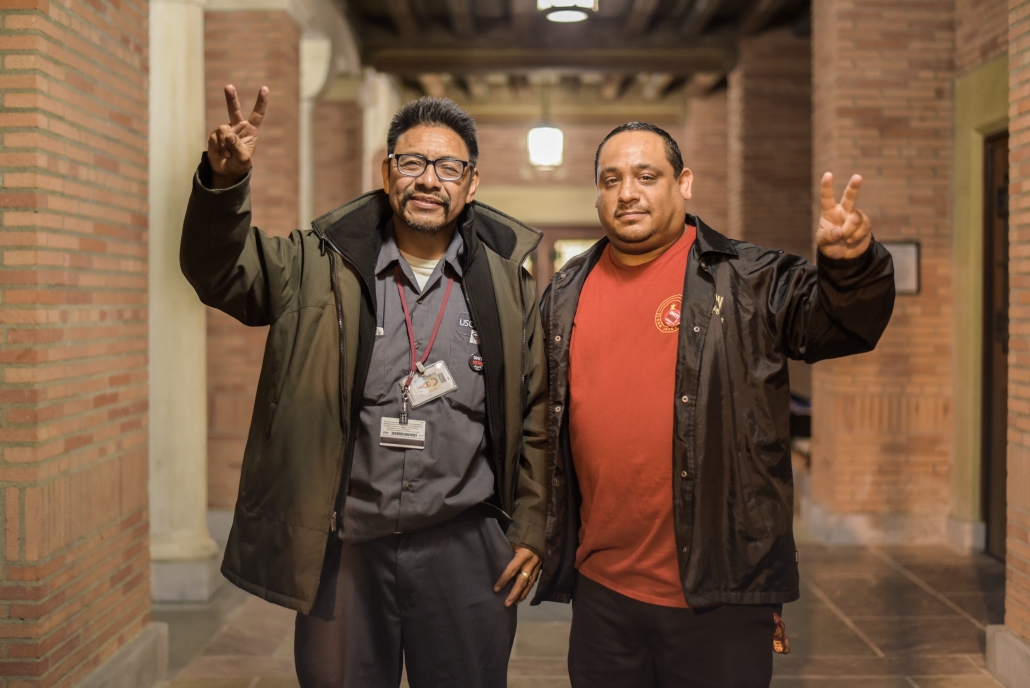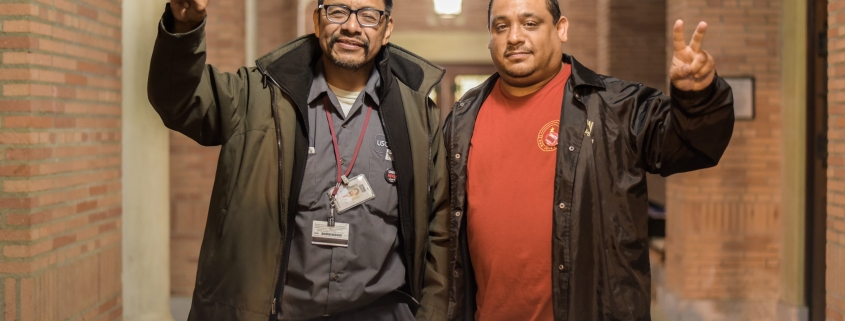USC staff demands better treatment

(Andrea Diaz | Daily Trojan)
Mario Perez lives paycheck to paycheck in Los Angeles with a family of five.
Perez has been working as a custodian at USC Housing for 13 years, and with his current salary and benefits, he can barely afford the cost of living in the city. He works a part-time job with Los Angeles Football Club during the summer for extra income, but since the MLS season is over, Perez is struggling to make ends meet.
“When I’m doing my part-time, I rarely have time to spend with my kids,” Perez said. “So I have to choose extra income or spend time with a family that is not happy.”
Unite Here Local 11, a local union, is handling the contract negotiations on behalf of the 800 housing and hospitality workers at USC. Hospitality includes the food service workers at campus dining options such as residential dining halls and Tutor Campus Center eateries.
Negotiations started Nov. 13 and are expected to continue over the next few months. The previous five-year contract expired July 1.
Perez said that workers are asking for a livable wage and a 40-hour work week. They also want to maintain their healthcare plan and include retirement benefits from the previous contract in the new one.
“We have a management there that’s cutting hours,” Perez said. “They don’t give enough to do for the workers … What are we going to give presents for kids on Christmas?”
The University maintains that workers are provided adequate salary and benefits that are competitive with other institutions.
“USC has a long history of successful negotiations with Local 11 to establish fair labor contracts,” the University wrote in a statement. “We are once again working hard to achieve a fair agreement.”
According to a 2018 report from the National Low Income Housing Coalition, Californians need an hourly full-time wage of $32.68 to afford a two-bedroom rental home. Perez said that he has co-workers who have worked at USC for more than 40 years and still make less than $18 an hour.
“I see my people that have been here for 48 years, we have a lady named Maria giving all her life to USC, and she don’t even get to $18 right after 48 years,” Perez said. “I don’t want to have that happen to me, and I don’t want that to happen to my other co-workers.”
Daniel Vollaire, who works at C&G Juice on the University Park Campus, said management frequently cuts his hours. He recently started a second job at Domino’s Pizza to afford rent.
“When I first got this job, I thought it would be enough to at least rent a little studio, but it’s not,” Vollaire said. “So I’m working two jobs now, [and] it’s still not enough.”
Vollaire also said USC provides insufficient retroactive pay after the contract negotiation period. Retroactive pay is granted when members work without raises while the union negotiates new contract agreements. Following the 2014 contract agreement, workers were given $400 in retro pay despite being promised $2,000.
“Most people don’t expect anything,” Vollaire said. “They already have a negative outlook on things, and they’re just used to getting the short end of the stick, so they’ll settle for the $400.”
During the first contract negotiation session at the USC Hotel last Wednesday, Unite Here Local 11 negotiator Austin Lynch presented worker demands to administrators for higher wages and better working hours. Student Coalition Against Labor Exploitation member Stephanie Solis, who was present at the negotiations, said that the University did not express sympathy for the plight of workers.
“Basically, the messaging that USC gave for students was that it is not USC’s responsibility to solve the homeless crisis,” Solis said.
Solis also indicated that USC negotiators pit students against workers by tying increased wages for workers to increased tuition for students.
“We know they have the money and it’s not dependent on students, and that’s just a tactic to scare us or to divide workers,” Solis said.
Solis, as a part of SCALE, has organized events to support workers during the contract negotiations. The organization put together a workers’ appreciation lunch was Nov. 11. The event allowed students and faculty to express their gratitude to workers at USC and discuss how to collaborate in the future.
David Krieger, a sophomore majoring in mechanical engineering, has organized clipboarding campaigns to recruit more student activists to support workers during the negotiation period.
“It’s been cool to see resoundingly that students, when they know what’s going on, they [know] this is an injustice,” Krieger said.
Nathaniel Hyman, a junior majoring in public policy and law, has also mobilized different student groups, including Latinx Student Assembly, Trojans for Bernie and Trojan Advocates for Political Progress, to build a coalition advocating for workers.
“I feel like [USC has] a moral obligation as one of the few institutions in California that is continuously prospering under very harsh conditions for low-income people,” Hyman said. “I think it is their ethical responsibility to use some of that windfall to help the less fortunate people who are part of their institution.”
Workers at other universities in California are protesting unfair treatment. American Federation of State, County and Municipal Employees Local 3299, a University of California employee union, went on a one-day strike Nov. 13 to protest University outsourcing practices which prioritize lower-wage contractors outside of the union. AFSCME filed six unfair labor complaints against UC, claiming its outsourcing policies broke state laws and University rules.
The Democratic National Committee relocated the sixth Democratic presidential primary debate from UCLA to Loyola Marymount University in support of the union’s struggles.

